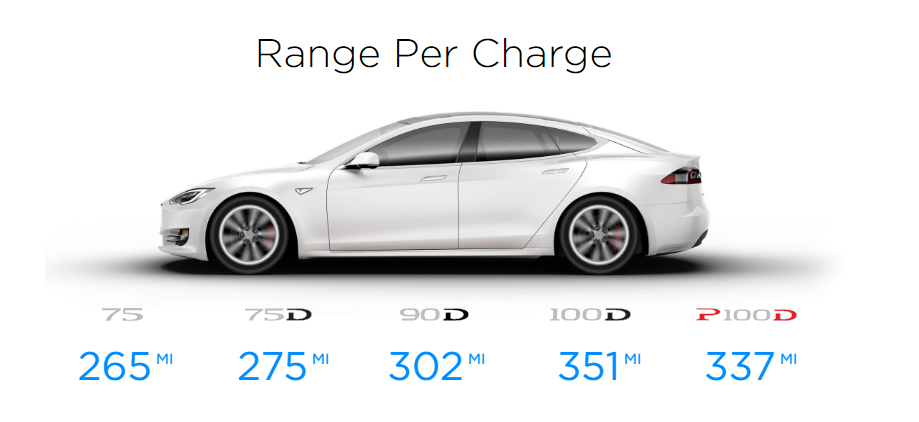Every now and then, a new company comes in, disrupts the status quo and upends the entire industry. But that kind of disruption happens more often in the software and devices segment, and is unheard of in large, mature industries such as the auto industry.
The beauty of Tesla’s disruption is that they didn’t really invent anything: they took what was already available, put it together in a way so many had done before them, and brought that to market. After overcoming what looked like insurmountable odds at the time, Tesla became a multi-billion-dollar global business.
The only difference was, they improved the hell out of every single component they touched.
Take the battery, for example. The technology has been available to us for decades. Today, Tesla’s Model S 100D offers an EPA-rated range of 350 miles on a full charge, and is the longest range electric vehicle in the world at the moment. Car makers are still struggling to get their EV ranges above 100 miles, and only a handful of them are even in a position to think of a 200-mile range.
But the biggest victory for Tesla, according to us, is not their successful EV business, but the way they took the humble electric vehicle mainstream, forcibly pulling every other automaker into the EV race.
In a way, you could say Tesla scared the hell out of its mainstream competitors with its constant state of high-demand-low-supply, making them wonder if staying out of the EV market would mean staying out of the entire automobile market in the future.
Today, every auto maker around the world – General Motors, Ford, Volkswagen, Nissan BMW, Mercedes Benz, Honda and many more – is working towards some form of alternative energy to power their cars of the future. Some are working existing technologies and some on experimental ones, but all of them are working towards reducing the future world’s dependency on fossil fuels.
Ten years ago, before Tesla came into the picture in a big way, a lot of these car companies were not even talking about EVs; and today, we have nearly all of them building an EV of their own – multiple lines of products, in fact.
That’s not to say the world would never have gone the EV route without Tesla, but the road would have been much longer, and the impact on the environment far more destructive.
There has been a simmering trend of electric alternatives to power automobiles for a long time, but Tesla accelerated that trend so much so that now, Volkswagen, one of the world’s largest car makers, wants to make sure they rein in Tesla in the premium EV segment – and not allow them to capture the mass market because Volkswagen wants to dominate.
” is a competitor we take seriously. Tesla comes from a high-priced segment, however they are moving down,” Mr Diess said, referring to the $35,000 Model 3, which enters production this summer. “It’s our ambition, with our new architecture, to stop them there, to rein them in,” said Herbert Diess, head of the VW brand, reported CNBC.
Now let’s rewind a few years and go back to 2009, when Dr. Martin Winterkorn, the Chairman of the Board of Volkswagen AG, during a speech in Munich, warned people against the evils of “electro-hype”, estimating that electric vehicles would have a “global market share of 1 to 1.5% in 2020.”
He also added: “We are witnessing an electro-hype. Experts, consultants and politicians tumble over one another with forecasts. And the auto industry doesn’t hold back on announcements. The result is massively false expectations by the customer…More than eight percent of drivers in Germany are rock solid convinced that the electric car is already here.”
How things have changed!
According to the International Energy Association, there were 1 million electric cars by the end of 2015 and “the market shares of electric cars rose above 1% in seven countries in 2015: Norway, the Netherlands, Sweden, Denmark, France, China and the United Kingdom. Market shares reached 23% in Norway and nearly 10% in the Netherlands.”
We still have three more years to hit 2020, and the odds are quite high for EVs to account for a substantial portion of cars sold at that time, not 1% to 2%. And it looks like the erstwhile detractor of EVs – Volkswagen – is ready to help the EV market share rise significantly.
Would all of this be true today if not for Tesla Motors? Possibly not. And even if Volkswagen gets its way and becomes the top mass-market EV producer in the world in the next decade, Tesla’s contribution to the EV movement is an undeniably large one that will live on in history books long after we’re all gone.
Whichever way you look at it, Tesla Motors has literally and figuratively electrified the century-old automobile industry towards a more positive future.
Thanks for visiting! Would you do us a favor? If you think it’s worth a few seconds, please like our Facebook page and follow us on Twitter. It would mean a lot to us. Thank you.




